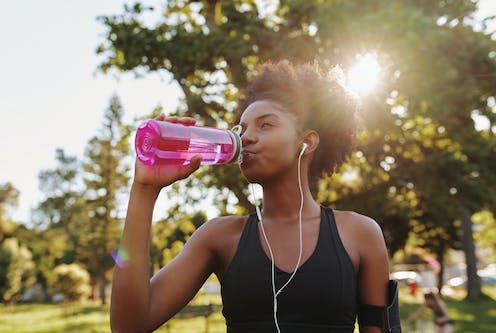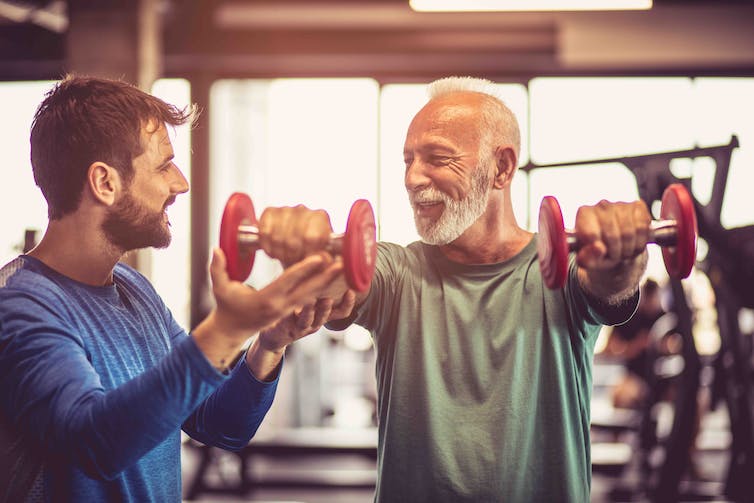
StratfordProductions/Shutterstock
A significant proportion of people who contract COVID are left with ongoing symptoms, commonly termed “long COVID”. The nature of these symptoms and the duration of the illness differ between people. While some people are still suffering more than two years after their initial infection, others have recovered, or at least improved.
As you’re recovering from long COVID, you may begin to feel motivated to get back to the physical activity you once enjoyed. While this might be possible at some stage, it’s important that you take your time with your recovery, accept your limitations, and make a slow return to exercise.
So if you were an active person before who, for example, ran half marathons or attended high-intensity interval training (HIIT) classes, don’t go straight back to these things. This is likely to exacerbate your symptoms and could set you back in your recovery.
A good first step is to speak with your GP or healthcare professional to see what’s available to help you with your recovery. For example, they might be able to direct you to community-supported programmes like exercise rehabilitation or walking and talking groups.
Table of Contents
Slow and steady
The UK’s National Institute for Health Research recommends a symptom-led approach to exercise during your recovery. This is where you structure your exercise plan based on the severity of your symptoms, rather than following a typical exercise programme that gradually increases intensity and volume over time.
It’s important to recognise that your progress is unlikely to consistently improve each week, and sometimes you may need to pull back on the amount of exercise you’re attempting to complete.
The key is to pace yourself by tailoring the volume and intensity of the exercise you do and prioritising rest in between sessions.
Make sure you only expend the amount of energy you think you have in your tank and don’t power through gruelling workouts with the view that it will be good for you afterwards.
Read more:
Getting fit after COVID? Why you should be strength training – and how to do it
During and after exercise, take note of your symptoms and particularly your level of fatigue or post-exertional malaise. Post-exertional malaise is when your chronic symptoms worsen after exertion (in this case, exercise).
This should be a cue to pull back on the amount or intensity of exercise you’re doing. If your levels of post-exertional malaise become moderate to severe and occur about half of the times you exercise, you should rest and speak with your doctor.
Types of exercise
Exercise doesn’t need to be something very difficult. You could begin with some simple chair-based exercises, such as standing leg curls or overhead punches (using the chair for support or sitting). You could then move towards sit-to-stand exercises or squats, and gradually build up to walking and light household tasks.
Once you’re further along in your recovery, try a combination of endurance and strength training. Strength training is useful as it avoids large increases in breathing rate and improves muscle strength. We know the latter can decline during a COVID infection and recovery.

Mladen Zivkovic/Shutterstock
Though evidence is still emerging, some studies have found exercise can offer benefits for long COVID patients. One study found that a six-week pulmonary rehabilitation programme (education and exercise) improved respiratory and cardiovascular fitness, reduced shortness of breath and boosted quality of life.
This agrees with a similar, more recent study where long COVID patients completed an eight-week programme of three exercise sessions per week (including both strength and endurance training). They reported significant improvements in quality of life, fatigue, muscle strength and cardio fitness compared with a control group who didn’t take part in the exercise programme.
Notably, the exercise sessions in this study were supervised and individualised to each patient. Qualified practitioners made amendments throughout to manage symptoms.
Where possible, it’s a good idea to seek support from an appropriate rehabilitation service in your area that can assist with creating your exercise plan or supervising your exercise sessions. If this isn’t possible, the World Health Organization offers useful information on how to safely return to exercise while recovering from COVID symptoms.
Other benefits
Exercise, along with a healthy lifestyle, can boost immunity and therefore offer some protection against future COVID infections and other pathogens. In particular, physical activity and good nutrition provide our bodies with more anti-inflammatory proteins, which reduce the storm of inflammation that can ensue from a COVID infection and make us very sick.
A new study, meanwhile, has found that regular physical activity is linked to COVID vaccines being more effective against severe disease.
Read more:
Long COVID: why it’s so hard to tell how many people get it
It’s worth thinking about what sports you enjoy and attempting to join a community of people, such as a walking and talking group. This has been shown to improve adherence to exercise.
Regardless of the exercise you choose, don’t overdo it or attempt to rush back to what you could do before COVID.
Finally, it’s important to recognise how unpredictable this condition is, and that long COVID can appear in many forms, from mild to very severe. Exercise will not be suitable for those who have more severe symptoms. It’s more appropriate, and indeed could be beneficial, for people with mild symptoms or who are recovering.
![]()
Steven Rimmer is affiliated with Burton Albion Community Trust.
Lewis Gough does not work for, consult, own shares in or receive funding from any company or organisation that would benefit from this article, and has disclosed no relevant affiliations beyond their academic appointment.





























